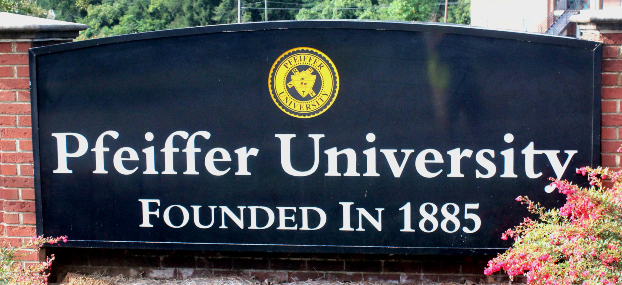Pfeiffer graduate lands jobs after CIA internships
Published 1:57 pm Monday, January 18, 2021

- Misenheimer, North Carolina
|
Getting your Trinity Audio player ready...
|
On a late afternoon in October 2012, as he headed to dinner after practicing with Pfeiffer University’s swim team, Cory Pooley checked his smartphone for messages. He noticed he had a voicemail from a random number in Washington, D.C.
Pooley would earn a Bachelor of Applied Science in Computer Information Systems from Pfeiffer in 2014. When he received the voicemail, he was a junior preoccupied with such common junior matters as studying and working part-time. He knew nobody in the nation’s capital. Who on earth could the caller be, he wondered?
Pooley listened to the voicemail: A woman wanted him to call her back so that they might “discuss an internship opportunity” — but she wouldn’t say where.
“It was the vaguest message I had ever heard,” Pooley said.
When Pooley returned the call, he began to grasp why the caller’s initial message had been so opaque. She worked in human resources at the Central Intelligence Agency. Pooley had answered an online ad for CIA interns — about eight months earlier. Was he still interested in the position?
“I thought, ‘This is kind of cool,’ ” Pooley said recently. “I was also taken aback. I didn’t know what to say.”
Eventually, Pooley did figure out what to say and do with his prospective employers. He landed two summer internships and a full-time job at the CIA, between 2013 and 2016. This made him an unusually strong candidate for his current employer, Cisco Stealthwatch Professional Services, for which he has been working as a manager in various project and service-delivery roles since 2016.
Securing employment at the CIA proved to be a daunting task for Pooley. During his junior year, he was intensely vetted during multiple interviews in Washington. He also took a polygraph test and underwent other procedures to gain security clearance.
Along the way, he gave up his spot as a long-distance swimmer on Pfeiffer’s team, having concluded that his trips to Washington would mean he’d miss too many practices. Also, had he remained on the team, he would have interfaced with multiple teammates from foreign countries — which the CIA viewed as potentially compromising from a security standpoint.
By the time the summer of 2013 rolled around, the CIA had approved Pooley’s application for employment as an intern. During the summer between his junior and senior years at Pfeiffer, he served as a project manager in assignments that entailed moving computer equipment to locations all over the world. He secured another internship at the CIA the following summer, working for the agency at the National Reconnaissance Office, which places satellites in outer space that orbit around the globe in different patterns.
After the internships and after graduating from Pfeiffer, Pooley landed full-time employment at the CIA as one of its Telecommunication Information Systems Officers, who train for months to do “anything” that features an electrical, plumbing or construction component. An officer’s tasks can include making sure the CIA stations are secured and in working order, setting up communications equipment that enables someone in a far-away desert to connect with Washington, or even fixing a toilet.
So, what accounts for the unusual success that Pooley achieved early on in his career?
“I knew that I didn’t want to be at the help-desk level for very long in my career,” he said. “If I could get out of that quicker, then I was going to do whatever I needed to do to make that happen.”
Pooley made his own luck, in other words — and Pfeiffer created the right kind of environment for him to realize his aspirations.
Pooley originally hails from Walkertown, a village near Winston-Salem. His interest in computers has its roots in an evening ritual of unwinding in front of one at home after swim practice.
As the time for enrolling in college approached, he wanted to do more than play video games and “chat” with friends. He wanted to acquire the kind of knowledge about computing that would enable him to pursue a career. At Pfeiffer, Pooley could do this both inside and outside a classroom: In addition to majoring in Computer Information Systems, he also interned in the school’s IT department. This made him interested in the security side of computers — how to secure a network, why it’s important to keep it secure, how people exploit security vulnerabilities and what they gain when they do. He chose cybersecurity as his major’s concentration.
He is now in a position to give back. This past November, he returned to his alma mater to deliver a talk for Pfeiffer’s Computer and Gaming Society on how to prepare for a career in information technology.
Dr. Ali Sever, who chairs Pfeiffer’s Computer Information Systems Department, organized the talk. He called it “well worth our students’ time out of the classroom to help them enhance their learning with real world experiences.”
“In addition, it was great that Cory included his entire career path from his Pfeiffer internship to the CIA to CISCO,” Sever added. “He provided ideas of what students should be doing to find a roadmap to potential career paths.”
Pooley seemed happy to share this information.
“I’m so grateful for the opportunities that came my way at Pfeiffer,” he said.
Ken Keuffel, who authored this article, has served as Pfeiffer’s Assistant Director of Communications since December 2019. He welcomes story ideas from Pfeiffer’s faculty, staff, students, alumni, and friends. The form for submitting story ideas is at www.pfeiffer.edu/newsform.





